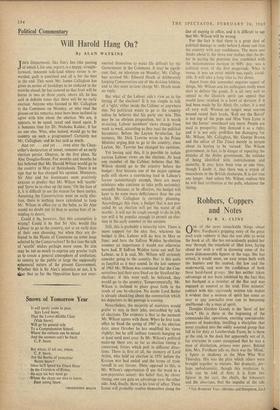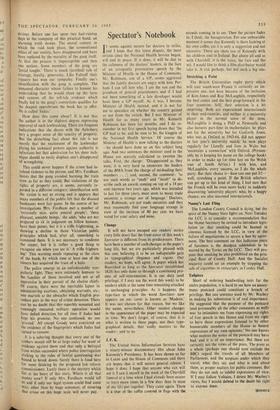Robbers, Coppers and Notes
By R. A. CLINE
ONE, of the most remarkable 'things about Mrs. Fordham's gripping story of the great mail train robbery is that she was able to write the book at all. She has miraculously picked her way through the minefield of libel laws, laying about her with a will in damning some of the more dishonourable figures in the saga. She has mixed, it would seem, on easy terms both with the hunters and the hunted, the law and the underworld, and won the confidence of both these hard-faced groups. She has neither taken advantage of nor been inhibited by the fact that her husband is a member of the Bar and was engaged as counsel at the trial. Five minutes' contact with this vigorously written tale makes it evident that a woman of spirit has come as near as any journalist ever can to becoming
spellbound—by a man of spirit. _
Douglas Gordon Goody is the 'hero' of her book.* He is there at the beginning of the commando-like operation, exerting considerable powers of leadership, instilling a discipline that never cracked into the oddly assorted group that fell in for duty at Leatherslade Farm; he is there at the end, in the dock but apparently not of it, for everyone in court recognised that he was a man of distinction, primes inter pares. Behind him, Mrs. Fordham tells us, there was the `Mind,', a figure as shadowy as the Man Who Was Thursday. His was the plan which others were brought together to execute. But dramatic, per- haps melodramatic, though this revelation is, little can be told of him; it is from live figUres in the cast, the chiefs, the labourers and the also-rans, that the impulse of the tale *Tun ROIUWRS' TALE. (Hodder and Stoughton, 21s.)
derives. Before one has spent two hair-raising days in the company of this piratical band, an alarming truth dawns. The moral context in which the raid took place, the conventional ethics of our society, have disappeared and have been replaced by the morality of the gang itself. At first the process is imperceptible and then one notices. Some members of the gang are `jovial toughs.' There is much (justified) talk of courage, loyalty, generosity. Like Falstaff their roguery has won our sympathy. Finally one's identification with the gang is complete. The unnamed character whose failure to honour his Undertaking that he would clean up the farm and remove all the tell-tale evidence which finally led to the gang's convictions qualifies for the deepest opprobrium the book has to offer. He is called 'Judas.'
How does this come about? It is not that the author is in the slightest degree expressing approval of such lawbreaking. There are frequent indications that she shares with the Aylesbury jury a proper sense of the sanctity of property. But the disturbing fact about this tale is not merely that the excitement of the lawbreaker Pitting his technical powers against authority is infectious but that admiration for his sheer tech- nique should so easily displace one's disapproval of wrongdoing.
This could never happen if the crime had in- volved violence to the person, and Mrs. Fordham insists that the gang avoided harming the train crew as far as they could. But violations of the rights of property are, it seems, currently re- garded in a different category; identification with the victim is not as strong and it appears that many members of the public felt that the disused banknotes were fair game. In the course of her investigations Mrs. Fordham met a number of 'extremely nice, quite amoral people'; 'these Pleasant, amiable beings,' she adds, 'who are not prepared to sit in judgment on fellow humans, have their points, but it is a trifle frightening, as showing a decline in those Victorian public principles which had, after all, something to commend them. It is not necessary to condemn the sinner, but it is rather a good thing to recognise sin when you see it.' A trifle frighten- ing! This warning needs repeating at the close of the book, by which time at least one of the sinners has acquired the trace of a halo.
The police emerge in in unfashionably sym- pathetic light. They were extremely humane to the families of those involved and not at all Oppressive in their pursuit of the elusive chiefs. Of course, there were the inevitable lapses in administering cautions, obtaining warrants, etc.; one marvels at the obstacles which English pro- cedure puts in the way of crime detection. There Can be no doubt that this superbly mounted and cunningly executed military operation would have defied detection for all time if Judas had kept his promise. No one confessed, no one grassed.' All except Goody were convicted on the evidence of the fingerprints which Judas had agreed to remove.
It is a sobering thought that every one of the robbers would still be at large today for want of evidence against them and that only a betrayal from within succeeded where police interrogation sticking to the rules of lawful questioning was bound to break down. Surely there is food here for some thinking by the proposed law reform commissioners. Lastly there is the mystery which lies at the heart of this story. Where is all that money now? If only Mrs. Fordham would tell us and if only our legal system could find some Way. other than by huge sentences, of ensuring that crime on this huge scale will never pay.



































 Previous page
Previous page